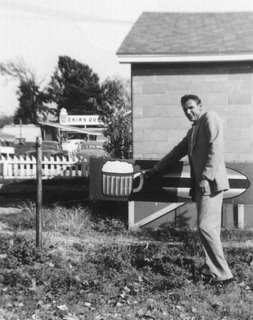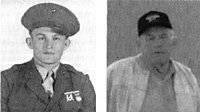ON THE AVENUES: Killer Diller.
A weekly web column by Roger A. Baylor.
The last surviving member of Glenn Miller’s “civilian” orchestra
has died.
Paul Tanner, a trombonist with the Glenn Miller Orchestra who became a prominent jazz educator at UCLA and created an unusual electronic musical instrument heard on the Beach Boys' classic 1966 hit "Good Vibrations," has died. He was 95.
Paul Tanner’s last performance with Glenn Miller came 71 years ago, prior to the bandleader joining the Army, where he formed a new military aggregation to play for the troops in Europe. Miller died in a plane crash in 1944, and 22 years later, his former employee played on a Beach Boys hit. By then, I was 6 years old, and can remember hearing “Good Vibrations” on the radio.
Will the circle be unbroken?
Mostly I grew up listening to big band records like those of Glenn Miller. They weren’t the original 78 rpm recordings, but the long-playing compilations that began appearing during the 1960’s as original listeners grew older, and a lucrative market for nostalgia came into being.
My father, who served three years in the Pacific during the war, had no musical aptitude of which I’m aware apart from singing Marine Corps boot camp anthems while mending barbed wire fences on the farm, but it didn’t stand in the way of his favored weekly ritual of playing World War II-era songs on Sunday morning.
It was music, not church. If memory serves, his all-time favorite was “Sentimental Journey,” and nothing better describes his customary mood, looking back through the years, than this choice of ditties.
Like so many of his wartime generation, my dad adored the music of Glenn Miller, who was a veritable hit-making machine from the mid-1930s through his death. At the age of 10, I could reel them off by heart: In the Mood, I’ve Got a Gal in Kalamazoo, American Patrol, Tuxedo Junction, Elmer’s Tune, Moonlight Serenade and Chattanooga Choo Choo, among others.
As for the latter, Miller’s big band era counterpart Artie Shaw – an irascible, erudite and unrepentant curmudgeon who died at 94 in 2004 – once said, “Glenn should have lived and Chattanooga Choo Choo should have died.” Shaw’s bon mot reflects a certain annoyance among jazz and swing purists that Miller’s work was overly commercial, and it may have revealed the clarinetist’s own dissonance; he, too, led a military band into war zones (Pacific Theater), but survived into old age, seldom revered. Miller never had to face the post-war shift change in popular music taste, which already was killing the big bands before the war killed Miller.
In short, James Dean wasn’t the first American cultural icon to die young and stay pretty.
---
For the longest time, I was unable to square my dad’s attachment to this music with those three years of duty as a Marine gunner aboard the USS Washington. How can music elicit nostalgia about the dangers of combat on the front lines? What’s more, how could such sweet and innocuous music ever have transferred psychologically to a battlefield in the first place? Isn’t fighting about anger? For soldiers in Vietnam to have the Doors, and during the Gulf War to be thinking about Metallica, makes perfect sense – but Moonlight Serenade?
At some point, I finally understood that nostalgic memories like my father’s almost always exclude what was bad about the past, all the better to focus with total recall on what was good; seeing as the whole idea back in the day was to get home alive so there’d be the time needed to grow old, it strikes me that nostalgia usually references the strength, vitality and unlimited horizons afforded youth. Those are the things we miss the most.
While I try to resist the nostalgic temptation, it’s clear that when more of life lies behind you rather than ahead, you understandably enjoy the reverie of recalling when the chronology (joyously) was the other way around, even if nothing can be done to facilitate a reversal at this late date. Hence the old, outdated music, from Genesis to Replacements, still spinning in my own head today as I try to make sense of my 1980s travels in the East Bloc, almost a quarter-century after the Wall came down.
At least it was just a “cold” war.
---
The central point here is that thanks to my non-musical father’s musical obsessions, I carry the legacy of the big band period with me always, and when I say “with me,” it’s purely literal in addition to metaphorical. He couldn’t have known it, and I wouldn’t have been able to explain it as a child, but music has been a constant presence with me for as long as I can remember, in spite of my not possessing a shred of vocal or instrumental aptitude apart from frightening the cats while singing while in the shower.
Does whistling qualify as music?
And so music plays in my head every single day. Glenn Miller had a hit song called Juke Box Saturday Night, but with me, it’s Juke Box All the Damned Time. Music plays in my dreams, and the random song generator pops into place when I awaken. In my personal episode of Rod Serling’s “Twilight Zone,” it’s a given that when the music finally stops playing, I’ll soon die. Thus, it’s axiomatic that the music … the show … must go on.
---
At some point during my teens, it was a late summer’s night in Southern Indiana. The windows were open, it was warm outside but with a slight nip in the air, and leaves just on the cusp of turning were rustling amid a breeze in the woods. The song in my head as I lay in bed was “Manhattan Serenade,” in all respects a forgettable pop song, circa 1942, as performed by the Tommy Dorsey Orchestra with Jo Stafford on vocals.
For whatever reason, something just clicked. Surely it was a coincidence. Probably I was ready to contemplate mortality in some way I hadn’t previously, to imagine an anonymous song, a lost era, a pastoral scene and my own tombstone in a cemetery filled with hundreds of others – the whole, huge, meandering procession of history; somehow grafting the chairs lined up in “Our Town” onto my brief lifespan, the unfulfilled hopes and dreams, the fears and uncertainties arranged like books on a shelf, and basically, momentarily, glimpsing a small bit of the finality of death.
It was confusing, wistful and melancholy. Oddly, it wasn’t debilitating. Rather, it may have been my first exposure to the quality known as the elegiac; by definition, a sacramental summary of what has passed, offered by the living looking backward.
The whys and wherefores are not clear, only that it’s something about Paul Tanner’s wire service obituary, following on the heels of a recent week delving into the Glenn Miller CD archive, while thinking about where we’ve been and where we’re going, and the music still playing all the while. It rouses the elegy gene, and here we are, ruminating ... in the elegiac mood.
Moonlight Cocktail? Need a few.




















